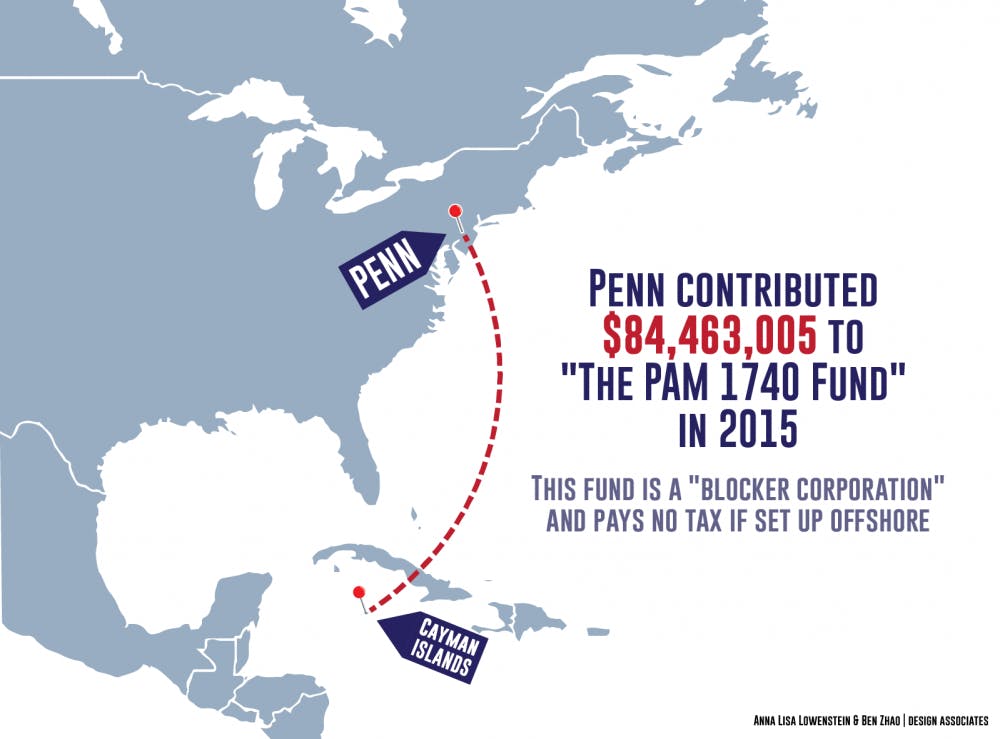
Movie stars, business magnates, and princes aren’t the only ones who take advantage of offshore tax havens to hide their money and grow their wealth. Universities like Penn do it too.
Earlier this month, the International Consortium of Investigative Journalists released over 13 million documents identifying a range of individuals and organizations that have stored trillions of dollars in offshore tax havens — these documents are commonly referred to as "The Paradise Papers." Among the entities identified were over 100 top United States universities, including Columbia University, Princeton University, and Penn.
Penn’s most recent Form 990, a tax document that nonprofit organizations must file annually, identifies four “related organizations taxable as organizations or trusts” in the Cayman Islands, a British territory with virtually no taxes.
The four funds, which are called Naya 1740 Fund, Pine River 1740 Fund, Pine River 1740 Tactical Fund, and PAM 1740 Fund, are entirely owned by Penn. The "1740" in each of their names serves as a nod to Penn’s founding date.

Though obscure, these funds handle massive amounts of money. In the fiscal year of 2015, Penn made a capital contribution of $84,463,005 to PAM 1740 Fund.
These funds almost certainly qualify as “blocker corporations,” said Samuel Brunson, a law professor at the Loyola University Chicago who specializes in tax policy.
Blocker corporations are commonly used by wealthy individuals or organizations looking to skirt American taxes. While Penn’s status as a nonprofit exempts it from taxes that it might otherwise pay on its endowment returns, it is still taxed on income from investments made with borrowed money, including money invested in private equity funds and hedge funds.
These private funds, while riskier than the government equities that universities have traditionally placed their money in, can also be much more lucrative.
In order to secure the larger returns associated with private funds but avoid their associated taxes, universities can set up special corporations — called blocker corporations — in tax havens like the Cayman Islands. Those corporations then invest the money in private funds, effectively establishing a layer between the university endowment and the funds in which it invests.
“Because it’s in the Cayman Islands, the corporation won’t pay taxes,” Brunson said. “It pays a small annual fee to the Cayman Islands, but it doesn’t pay taxes, so it’s as if it were a pass-through for tax purposes.”
The arrangement, while completely legal and common among nonprofit organizations with large endowments, raises questions of how colleges should be handling their money, especially in an era of climbing tuition prices and mounting student debt. Critics argue the purpose of an endowment is to fund research and learning, not to pursue risky private investments that avoid taxes.
“For universities specifically, they are the institutions that think about how society should work and determine how society should work, and if universities are avoiding taxes and are already given a tax exemption, then they’re setting a bad example for the rest of society,” said Dan Apfel, a senior associate at the Croatan Institute who formerly directed the Responsible Endowments Coalition.
Universities already benefit from many tax exemptions, Apfel noted.
“Universities have started acting more like Wall Street investors,” he said. “Really, their primary focus shouldn’t be how to get involved in risky investments; it’s about education and research, and they should be focused on that.”
Peter Ammon, Penn’s chief investment officer, said the University's investment strategy isn’t concerned with the structural aspects of funds — what is important is their ability to maximize returns and adhere to ethical standards.
“Penn’s portfolio is broadly diversified across strategies and geographies,” Ammon said in a statement. “We hold investments in many types of funds and partnerships as the managers we invest with choose to structure their investment vehicles in a variety of ways. Ultimately, Penn partners with investment managers based on their investment capabilities and ethical standards, not because of the structures of their funds.”
The funds, whose names link them to major American firms like Pine River Capital Management, were likely set up in partnership with those firms, Brunson said. But the fact that they are 100 percent owned by the University suggests they were set up for Penn’s exclusive use — a reflection of just how much money is involved.
Penn boasts one of the largest endowments in the country. This year, the endowment climbed to a record-high $12.2 billion, boasting a 14.3 percent return on investment, largely driven by equity investment.
Most schools’ endowments are far smaller: a 2015 report from the Congressional Research Service found that 74 percent of the $500 billion-plus accumulated in university endowments was concentrated among just 11 percent of schools.
Especially at schools with sizable endowments, students have focused their activism on where their school’s money is being invested; at Penn, students have spent years lobbying the Trustees to divest from investments related to fossil fuels.
Large endowments have also earned national scrutiny — in early 2016, two congressional committees sent letters to dozens of the nation’s wealthiest universities, seeking information about how they manage their endowment funds.
The current House Republican tax plan, which passed on Nov. 16, includes a 1.4 percent tax on the investment income of private schools with endowment assets of $250,000 or more per student.
That tax, however, would not affect offshore investments.
“There may be bad things about it — I don’t like the fact that we send a lot of money through tax havens — but that’s the way the tax law is written,” Brunson said of universities that invest money offshore. “It’s not morally good or morally bad.”
The Daily Pennsylvanian is an independent, student-run newspaper. Please consider making a donation to support the coverage that shapes the University. Your generosity ensures a future of strong journalism at Penn.
Donate






